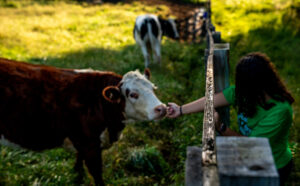CHEVY CHASE, MD (May 20, 2020) – A new survey commissioned by National 4-H Council found that 88 percent of U.S. teens believe having access to healthy food is a basic human right, though a majority say that unhealthy options are easier to access and more cost-effective. As COVID-19 continues to negatively impact the economy and create impossible situations for families struggling with food security and access, 4-H teens from across the country are stepping up their efforts to solve the problem through service and cooking.
37 million Americans, including 11 million children faced food insecurity in 2018 and these numbers are growing exponentially amid the COVID-19 crisis. The survey, which was completed prior to the current global pandemic, highlights that healthy eating choices are determined by access and necessity. More than a third (35%) of those surveyed say “healthy food is not easily accessible to me,” while a majority (84%) say, “junk food is too accessible.”
“Many young people and their families don’t know where their next meal is coming from, especially during this current global crisis, and choosing healthy options that are cost effective only becomes that much more difficult for economically challenged communities across the country,” said Jennifer Sirangelo, president and CEO of National 4-H Council. “This survey shows that today’s youth have an expressed interest in leading healthier lifestyles, and we’re pleased to serve and ensure that kids and their communities develop the healthy habits they need to thrive.”
The survey, which polled over 1,500 youth between the ages of 13-19 nationwide, was commissioned by National 4-H Council and conducted by The Harris Poll as part of the 4-H Healthy Habits Program. The program has reached over one million youth from across the country with nutrition education and physical activity, with an intentional focus on populations who face challenges in achieving positive health outcomes.
Other key findings from the survey include:
- Teens are interested in being active participants in solving the food crisis, as a majority said they would like to/or have donated money and/or volunteered within their communities.
- 68 percent say they satisfy their hunger with unhealthy foods because it’s more accessible to them at school than healthy food.
- Most teens wish there were healthier food options in their community (74 percent) and at home (69 percent), while 1 in 4 reported having to drive 30 minutes to buy groceries (25 percent).
- 84 percent surveyed say schools should teach students more about what makes food nutritious, while over half also believe supermarkets should incentivize health food choices through healthy grab & go options (55 percent).
- Most teens (66 percent) are spending more time deciding what they want to watch on Netflix and YouTube, than thinking about what they eat.
- 73 percent of youth say that they think they would eat healthier if healthy foods tasted better.
Since 2012, teens in the 4-H Healthy Habits Program have been finding ways to teach their communities about healthy living habits. But as the need for food access has grown in recent months, they’re finding new ways to serve with:
- Fresh produce boxes that are being created with the surplus crops farmers may otherwise destroy in Florida,
- A food delivery program to ensure students in need of meal assistance continue to get meals while out of school in Illinois,
- A community garden that provides free produce to community members in Georgia, and
- Blessing Boxes which are small sustainable food pantries for community members to walk up and grab nonperishables in Louisiana.
“Developing healthy eating habits starts at a young age and it can be hard to find the right resources when they’re not readily available in schools, grocery stores or other community gathering places” said Janya Green a 4-H Healthy Habits teen. “Through 4-H’s Healthy Habits program, I’ve been able to make a real difference in teaching kids and families in my community about making healthy choices, without creating a financial burden.”
In addition to getting food to those most in need, 4-H teens are making sure that healthy living habits continue to be a priority for American families. In response, the National 4-H Council released a free, digital cookbook, 4‑H Fresh Chefs, as a resource to encourage youth and their families to eat a balanced diet and make nutritious meals at home. The cookbook features a number of easy and affordable recipes from 4-H youth, celebrity chefs, and 4-H supporters including:
- Carla Hall, Celebrity Chef, 4-H Healthy Habits Program Ambassador and Tennessee 4-H Alumna
- Anne Burrell, Host of Food Network’s Worst Cooks in America: Celebrity Edition and Cookbook Author, New York 4-H Alumna
- Trisha Yearwood, Award-Winning Singer, Cookbook Author, Executive Producer and Host of Food Network’s Trisha’s Southern Kitchen, Georgia 4-H Alumna
“It’s important for young people to build a lifetime of healthy eating habits early on, through a thoughtful and balanced approach towards food,” said Celebrity Chef and 4-H Healthy Habits Program Ambassador Carla Hall. “The 4-H Healthy Habits Program exposes youth to essential life skills such as health conscious cooking, eating, and decision-making that can impact their futures as well as the future of their communities. I’m glad to partner with 4-H and share my passion for mindful eating and living with the next generation of young leaders.”
To learn more about the Healthy Habits Program and to download a free copy of the Fresh Chefs Cookbook, please visit https://4-h.org/parents/healthy-living/healthy-habits/.
4-H, the nation’s largest youth development organization, grows confident young people who are empowered for life today and prepared for career tomorrow. 4-H programs empower nearly 6 million young people across the U.S. through experiences that develop critical life skills. 4-H is the youth development program of our nation’s Cooperative Extension System and USDA, and serves every county and parish in the U.S. through a network of 110 public universities and more than 3000 local Extension offices. The research-backed 4-H experience grows young people who are four times more likely to contribute to their communities; two times more likely to make healthier choices; two times more likely to be civically active; and two times more likely to participate in STEM programs.
Learn more about 4-H at www.4-h.org, find us on Facebook at WWW.FACEBOOK.COM/4‑H and follow us on Twitter at www.Twitter.com/4H.
















